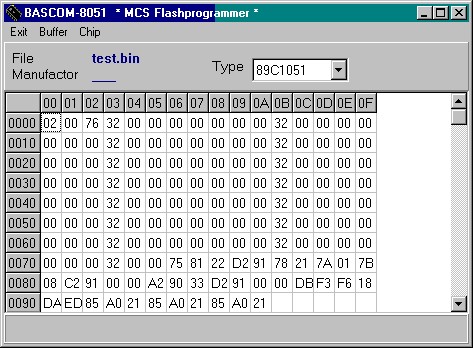There are different models of the MCS Flash programmer, but all of them are compatible with the driver software.
The MCS Flash programmer is a parallel printer port based programmer.
It can only program the ATMEL 89C1051 , AT89C2051 and AT89C4051.
Select the correct printer port address before you run the programmer.
Be sure to switch on the power supply before running BASCOM.

When you run the programmer, the buffer will be filled automatically with your program data. The programmer works with binary files. The following menu options are available.
Exit
Exit the programmer.
Buffer clear
Clear the buffer. That is, fill it with zero bytes.
Buffer Read from disk
Load a file into the buffer. By default the current program.BIN file is selected.
Select a file with the file selection dialog box and press the Ok-button.
Buffer Write to disk
Write the content of the buffer to a file.
Note that the file size is 1024 ,2048 or 4096 bytes depending on the chip type.
Buffer read from chip
Read the content of the FLASGROM into the buffer.
If the lock bits are set all bytes will return FF.
Buffer Write to chip
Program the chip with the content of the buffer.
The chip is erased before the buffer is written to the chip.
Buffer Verify
Compares the content of the buffer with the content of the chip.
Buffer program chip
Erases the chip, writes the buffer to the chip and finally verifies the buffer with the chip.
Chip get type
Retrieves the chip type. AT89C1051 , AT89C2051 or AT89C4051.
Chip Erase
Erases the chip. Lock bits are also erased.
Chip Set lockbit 1
When LB1 is set the chip can not be programmed anymore.
Chip Set lockbit 2
When LB2 is set the chip can not be programmed nor can it be verified (read)
Use LB1 and LB2 together for securing your program.
Options LPT1 .. LPT3
Select the printer port the programmer is connected to.
Option Port delay
Because computers become faster every day and the hardware is run by software a delay can be specified for very fast computers.
A value of 5 is used on a 486DX266. You must increase the value on faster computers if problems occur.
The default is 0, and for best results, 0 should be used.